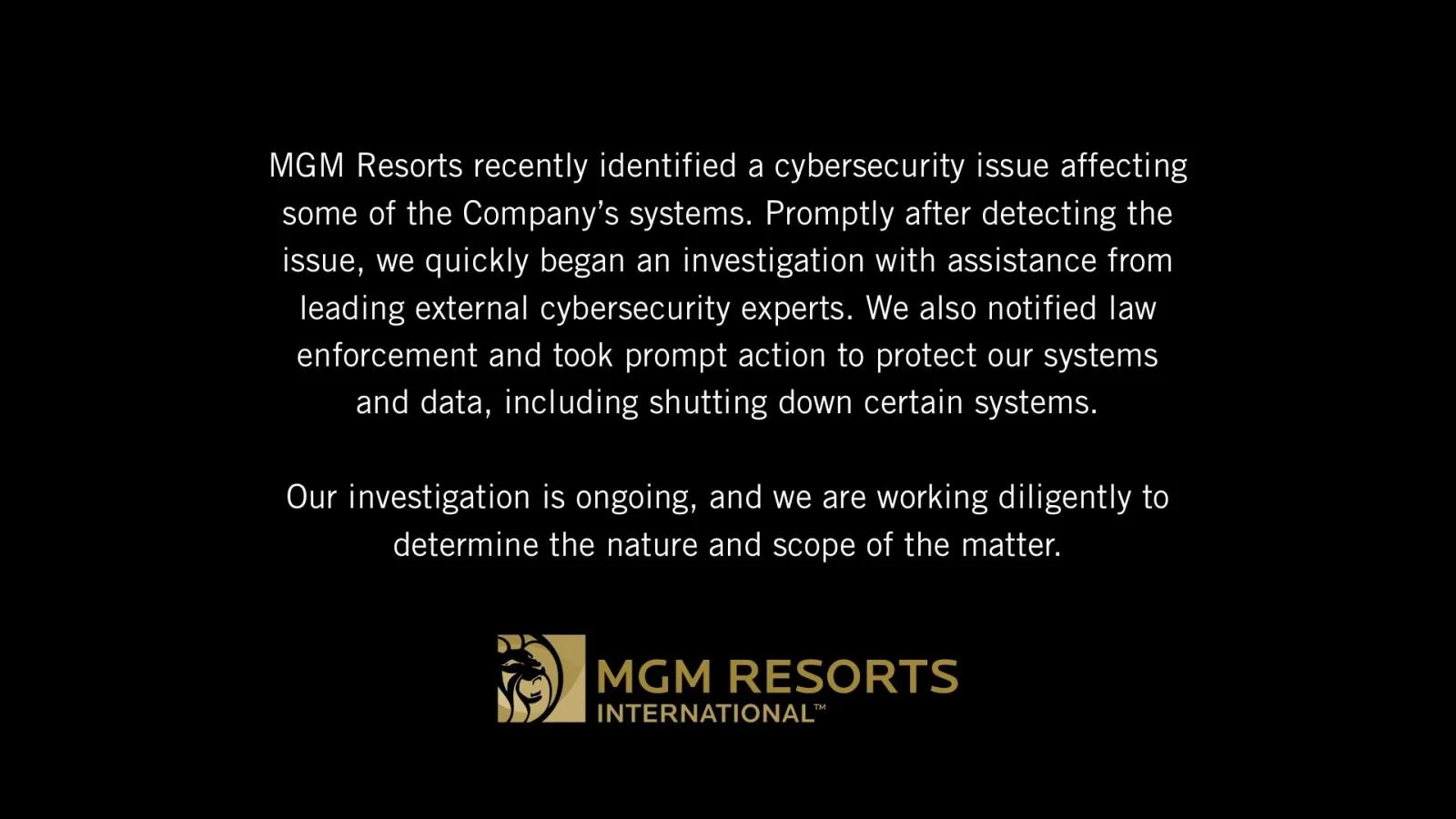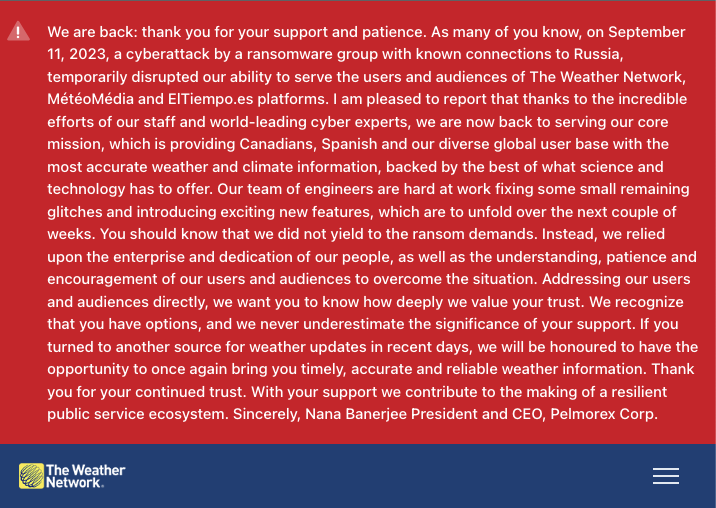Recent Cybersecurity Incidents:
Lessons Learned from The Weather Network and MGM Grand Vegas


Cybersecurity incidents are an ever-present threat in today’s digital landscape.
With businesses and organizations relying heavily on technology, the stakes are higher than ever when it comes to protecting sensitive data and systems. Two recent high-profile incidents involving The Weather Network and MGM Resorts in Las Vegas serve as stark reminders of the critical importance of cybersecurity in business operations.
- In September 2023, The Weather Network, a popular source for weather forecasts and information, fell victim to cybersecurity incident connected to a third-party software provider.
- Around the same time, MGM Resorts, one of the world's largest casino and hospitality companies, experienced a cyber attack that disrupted its operations, including its main website, online reservations, and in-casino services, like ATMs, slot machines, and credit card machines.
What can we learn from cyber attacks like these?
Cyberattacks are Sophisticated:
Both incidents highlight the evolving nature of cyber threats. Attackers are increasingly using advanced techniques, such as phishing, ransomware, and supply chain attacks, to breach organizations’ defenses.
The Human Element:
In many cases, human error plays a critical role in a breach. A single click on a malicious link or attachment can lead to devastating consequences. Employee cybersecurity training and awareness are essential for preventing these incidents.
Third-Party Risks:
Businesses must be vigilant about the security practices of their third-party vendors. A weak link in the supply chain can expose the entire organization to risks.
Data Protection is Paramount:
Protecting customer and employee data should be a top priority. Implementing robust encryption, access controls, and monitoring systems can help safeguard sensitive information.
Cybersecurity is not solely the concern of large corporations or high-profile organizations.
Medium and small-sized businesses (SMBs) are just as susceptible to cyber threats, if not more so, due to limited resources and potentially less robust cybersecurity measures.
Cybersecurity is not exclusive to large enterprises; it is equally critical for medium and small-sized businesses. The consequences of cyberattacks can be severe, including financial losses, reputational damage, and legal repercussions. SMBs must prioritize cybersecurity by implementing robust security measures, conducting employee training, and staying vigilant against emerging threats. Investing in cybersecurity is an essential aspect of ensuring the long-term success and sustainability of any business, regardless of its size.
Examples of Cybersecurity Incidents on SMBs:
Ransomware Attack on a Local Retailer:
A small retail store’s point-of-sale (POS) system was compromised by ransomware. The attackers encrypted customer payment data, rendering the POS system unusable. The business had to pay a significant ransom to regain access to their systems and prevent customer data leaks.
Phishing Scam Targeting a Law Firm:
A medium-sized law firm fell victim to a sophisticated phishing attack. An employee received an email that appeared to be from a trusted client, but it contained a malicious attachment. This led to a data breach, exposing sensitive client information and damaging the firm’s credibility.
Supply Chain Attack on a Manufacturer:
A small manufacturing company was targeted through a supply chain attack. Cybercriminals compromised a supplier’s systems and used it as a pivot point to gain access to the manufacturer’s network. They stole intellectual property and sensitive product designs, affecting the company’s competitive edge.
Unauthorized Access at a Local Healthcare Clinic:
A small healthcare clinic experienced a security breach when an ex-employee retained access to patient records. This breach led to unauthorized access to sensitive medical information, violating patient privacy and resulting in regulatory fines.
Let's compare the impact of a cybersecurity breach on a small business versus a large, established business.
Resources:
Smaller businesses typically have fewer financial and human resources to dedicate to cybersecurity. As a result, the financial impact of a breach can be disproportionately higher for them. Larger businesses generally have more financial resources and dedicated cybersecurity teams. While the financial impact can still be substantial, they may have better capabilities to absorb the costs.
Revenue:
A cybersecurity breach can represent a significant percentage of a smaller business’s annual revenue. Recovery costs, including legal fees, breach notification, and system repairs, can be substantial. Larger businesses often have diverse revenue streams, which can help them mitigate the impact of a breach in one area of their operations.
Reputation:
Smaller businesses often rely heavily on customer trust and word-of-mouth marketing. A breach can erode trust among customers and partners, leading to a loss of revenue as customers choose competitors with better security practices. Larger businesses may have a global presence and a well-established reputation. While a breach can damage their reputation, they may have the capacity to recover more quickly due to their brand recognition and customer base.
Business Continuity:
Smaller businesses may struggle to maintain business continuity during a breach, leading to disruptions in operations and further financial losses. Larger organizations are more likely to have comprehensive disaster recovery and business continuity plans in place. They can allocate resources to ensure that critical functions continue even in the face of an attack.
While cybersecurity breaches can have serious financial implications for both small and large international businesses, the specific impacts can differ significantly due to factors such as available resources, revenue diversification, regulatory obligations, and brand recognition.
Small businesses often face a more substantial proportional impact, whereas large international businesses may have the ability to absorb some of the costs more easily but still face significant financial and reputational risks. This underscores the importance of proactive cybersecurity measures for all businesses, regardless of their size.
The Importance of Cybersecurity
These incidents serve as stark reminders of the significant financial and reputational damage that cybersecurity breaches can cause.
The threat landscape is continuously evolving, and organizations must adapt by investing in robust cybersecurity measures and fostering a culture of security awareness. By doing so, they can protect their assets, customer trust, and their very existence in an increasingly digital world.
Here are some key takeaways:
Proactive Defense:
Implement proactive cybersecurity measures, such as firewalls, intrusion detection systems, and regular vulnerability assessments, to identify and mitigate potential threats before they become serious.
Employee Training:
Educate your employees about cybersecurity best practices to minimize the risk of falling victim to phishing attacks or other social engineering tactics.
Incident Response Plan:
Develop a comprehensive incident response plan to swiftly detect, contain, and recover from cybersecurity incidents.




